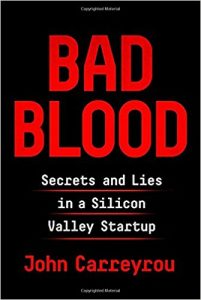By MATTHEW HOLT

You’ve probably seen by now both that the WSJ’s John Carreyrou has run a well researched hit piece on Theranos and that the company, led by wunderkind Elizabeth Holmes, has somewhat muffed its reply. If you haven’t, best thing is to read the Roger Parloff Fortune piece which summarizes the pay-walled piece so you don’t have to do the painful task of sending Rupert Murdoch money. Now in the spirit of FD I need to let you know that we’ve invited Holmes to speak at Health 2.0 twice and her PR handlers have been unbelievably hard to communicate with. They’ve either flat out ignored us or taken forever to turn us down, even though she’s appeared often at (what I at least consider) much less important or relevant venues. I have no idea if she’s badly advised, wanting to stay away from sophisticated health tech audiences, or if her handlers decided that we and our 2,000 strong crowd are just not cool enough for her. Or maybe simply her calendar hasn’t allowed it. Either way I have no first hand knowledge of her or the product–although Elizabeth our invite is still out there! But I do know five things.
1) Lab business decentralizes & democratizes. Whether or not Theranos is lying, cheating, not using its own tech, or its cool stuff just doesn’t work, the trend towards comprehensive, cheap and soon at home lab testing is clear. More than 5 years ago a company called BioIQ was selling at home fingerstick based cholesterol & glucose tests. In the past year the two stage Nokia Sensing XCHALLENGE (of which we hosted stage 1 at Health 2.0 in 2013) has revealed a plethora of companies taking minute quantities of blood, pee or spit and doing complex diagnosis from them. And it’s not stopping there. The next phase is using light and other sensors to diagnose direct from the skin. Whether or not the locus of activity ends up using Theranos at Walgreens or the kitchen table using something else, the dam holding back continuous, cheap multi-faceted testing is going to burst soon.
2) Theranos and Holmes are not the most important thing in health care. There, I’ve said it. While Holmes has talked a lot about revolutionizing health care access and has given lots of transparency into Theranos’ pricing if not its testing technology, what they’re up to is getting easier access to lab tests. I think this is very important and a very good thing, but no one can seriously believe that this is the biggest change in health care. It’s part of a trend towards consumerism. But I’d argue the most important trend in health care is the redesign of chronic care management, on which we spend a shed-load more than lab testing. I may be wrong but if you insert your pet issue here, I’d bet it’s not cheaper lab testing. The media has been a tad snowed by the “youngest female billionaire” and “blonde Steve Jobs” analogies, but even if she runs the field and takes over most lab testing, it’s an incremental change not a huge revolution in health care.
Continue reading…














